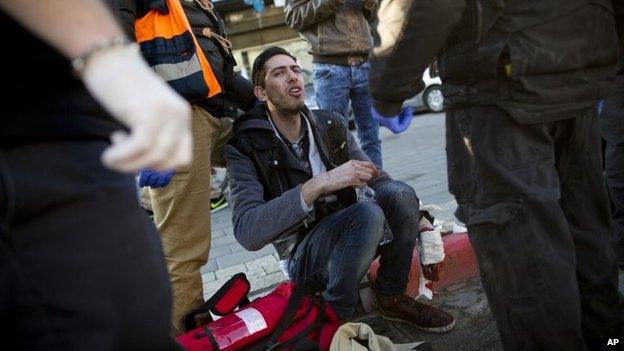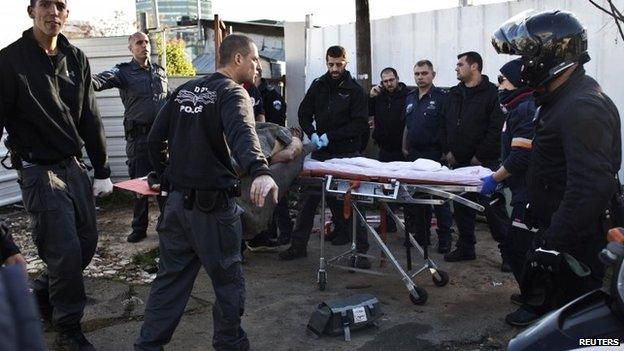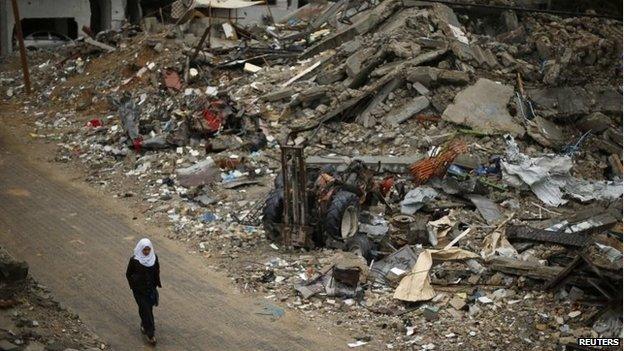Israel bus attack: Tel Aviv passengers stabbed
- Published
Officers are patrolling the area to prevent further attacks
Israeli police say they have shot a Palestinian man from the West Bank who stabbed at least 11 people in an attack on a bus in central Tel Aviv.
The incident occurred on Maariv bridge where the suspect attacked people both on and outside the bus, police said.
Police say they are treating the incident as a terrorist attack.
The perpetrator attempted to flee the scene following the attack, and was lightly wounded after being shot in the leg, a police spokeswoman said.
Three of the victims were in a serious condition, with the others moderately or lightly wounded, according to the ambulance services.
Officers are patrolling the area to prevent further attacks, police spokesman Micky Rosenfeld said on his Twitter account, external.

Injured people were treated at the scene of the attack

Israeli police took the injured suspect to hospital
Police officials said that the suspect was an illegal worker from Tulkarem, a town in the occupied West Bank.
The 23-year-old said he had carried out the attack in response to Israel's military operations in Gaza last year, and tensions over access to religious sites in the old city of Jerusalem, police added.
More than 2,100 Palestinians were killed in Gaza during the conflict in July and August last year. The majority of those killed were civilians, according to the UN.
Sixty-seven Israeli soldiers, and six civilians in Israel, were also killed.
Wednesday's attack took place during the morning rush hour.
"The terrorist stabbed the bus driver several times but the driver fought back until he [the suspect] fled on foot and was neutralised by a guard from the prisons' service," a police statement said.
.jpg)
Eyewitnesses said the driver fought back by using pepper spray on the attacker.
A prisons' service officer told army radio how the attack unfolded.
"We saw the bus swerve to the side... then stop at a green light," the officer, identified only as Benny, said.
"Suddenly we saw people running out of the bus and when we saw them shouting for help, we jumped out... and started running after the terrorist. At first we fired in the air, then at his legs."
Israeli Prime Minister Benjamin Netanyahu blamed Palestinian Authority leader Mahmoud Abbas for the attack.
The attack was "the direct result of the poisonous incitement being disseminated by the Palestinian Authority against the Jews and their state", he said.

More than 2,100 Palestinians were killed in last year's Israel-Gaza conflict and 18,000 homes were destroyed
The Israeli government frequently accuses Palestinian groups of inciting violence.
The government has been angered by Mr Abbas' efforts to secure Palestinian membership of the International Criminal Court (ICC) and agreement to a unity government with militant group Hamas.
The Palestinians blame Israeli government policies, particularly the expansion of settlements, for the increase in violence, correspondents say.
'Heroic attack'
Hanan Ashrawi, a senior official with the Palestine Liberation Organisation, condemned the Tel Aviv attack. However, she added in quotes carried by AP news agency: "You cannot have a violent military occupation with full impunity and then expect all its victims to be calm and quiet."
Meanwhile, Sami Abu Zuhri, a senior Hamas spokesman praised the attack as "heroic", and "a natural reaction to Israeli terrorism against the Palestinian people and its holy places".
Israeli police say there has been a pattern established in recent months where individual Palestinians, without sophisticated weapons, have attacked civilians at random, the BBC's Kevin Connolly in Jerusalem reports.
Late last year, a number of Israelis were killed in attacks by Palestinians using weapons including knives and even vehicles to run down pedestrians.
At least 12 Palestinians were also killed, including several of those who carried out the attacks.
In one of the deadliest attacks, four rabbis and a policeman were killed in November when two Palestinians armed with a gun and meat cleavers attacked a synagogue in West Jerusalem.